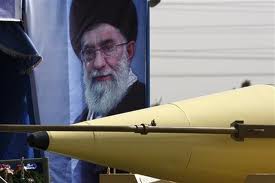 One of the arguments of Dennis Ross for giving another chance to diplomacy with Iran, is the decline of the Islamic Republic. The pro-Iranian lobby of experts of sorts, almost by definition, cannot argue that its client is in decline. Interestingly, the experts who usually cherish democracy, when discussing "engagement" with Iran, voice a strong opinion for the US guaranteeing the regime of the clerks.
One of the arguments of Dennis Ross for giving another chance to diplomacy with Iran, is the decline of the Islamic Republic. The pro-Iranian lobby of experts of sorts, almost by definition, cannot argue that its client is in decline. Interestingly, the experts who usually cherish democracy, when discussing "engagement" with Iran, voice a strong opinion for the US guaranteeing the regime of the clerks. The Arab spring, or awakening or revolt – dictionaries and vocabularies are at loss in trying to suggest the right word – is certainly not a harbinger of Jeffersonian, or God forbid, Israeli democracy. It is still unclear, notwithstanding the chorus of journalists, experts and politicians, what its outcome is going to be. However, be that as it may, and even if Islamist parties or tyrannies will become the rulers, it is clear that religion, in Iranian, or al-Qaeda or in any other mantle has not been the reason for the events. Plausibly, Iran, al-Qaeda and many others are trying to jump the bandwagon, a fact which proves once again their weakness. Furthermore, the events have shown that no regime is immune against possible winds of change. a principle which does not please the ears and eyes of any ruler, and even more so of a dictatorship.
Inability of Iran with Revolutionary Guards, with Basij, with Quds and with Hezbollah to assist quickly and effectively its embattled ally, Bashar al-Assad are not a sign of strength. The attempts to assassinate Israeli diplomats in Asia prove that Iran is unable to conduct such operations elsewhere. It had to use Iranians because apparently Hezbollah was unwilling to perform the operation out of fear of provoking Israel. The events in Syria have weakened Hezbollah too. It fears that any provocation of Israel might enrage Lebanon too. Hamas physically left Syria and virtually is distancing itself from Iran as well.
It is difficult to figure out what is the economic situation in Iran. Those who want to dissuade Israel from attack, are trying to describe Iran's economy in grim terms. Rial on the black market is falling in value, inflation rises, but probably the situation there is still far from crisis. On the other hand the strategy of survival of the Islamic Republic, like that of many other dictatorships, is based on relative middle class freedom and large private sector. Economic fears, justified or not do play an important role in the decisions of the regime.
Almost frantic declarations and their subsequent withdrawals point to nervousness of the Iranian leadership. They are about to close the Hormuz strait, and then decide not to do it. They decide to stop partial shipping of oil, and then say the shipping will continue. They say that they develop nuclear energy for peace and then brag about progress in armaments, and so it goes on and on twice or three times every week.
Mobilizing the huge pro-Iranian lobby of experts who are trying several times a day to convince the world that sanctions against Iran are harmful, because Iranian response would be irrational, and certainly that military attack by Israel is unwarranted, also show that Iran fears both.
The main problem with byzantine courts of dictators is reliable information. Nobody, perhaps even not the clerks, eunuchs and other courtiers know for sure what is in the cards. Everybody likes to blame Western and Soviet intelligence for failure in Hitler's wars, but at least in the beginning, most Generals were against war, eventually Hitler had his way. It was not an easy task to determine whether Hitler or the Generals will win the argument. It was natural to assume that the “professionals” know better. This was a wrong, but not trivially wrong, assumption. It seems that the question mark about Iran's intentions still looms large.
Israel trusts nobody about its security matters. The country still remembers, that, not now, but in 1948, when the new state was the darling of the whole world, when CIA and the State Department believed Israel is about to loose the war, they recommended to the President to abandon Israel. Still, there are various degrees of Israeli trust, perhaps lack of trust is a better phrase. Israeli leaders believe that Dennis Ross is a professional whose intent and integrity are to be respected, and who will not knowingly deceive them. There are very few American officials whom they regard in similar light. Still, Deniss Ross will have to work very hard to convince the Israelis that diplomacy should be given a chance. If Iranians are serious about doing business, they will have to show something new to Ross, whom they rejected in 2009 because he is a Jew. Then there is the Obama obstacle. The President likes to hear the opinions of zillion of advisers, and usually choses the worst among them, thus spoiling a possible solution. Fortunately, election politics, might discipline him.
In any event the crack opening of the window of diplomacy and engagement -- perhaps a word better suite for premarital relations -- is short lived.

אין תגובות:
הוסף רשומת תגובה